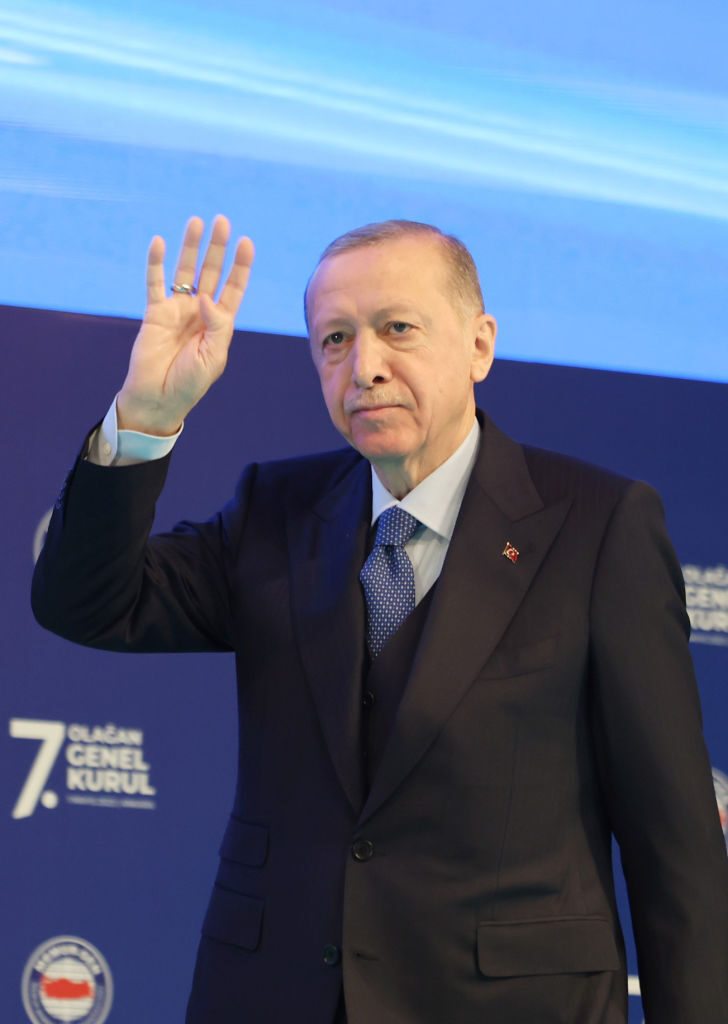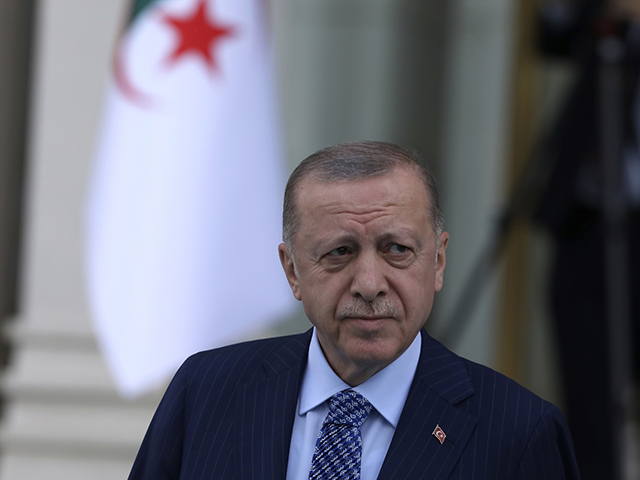Islamist Turkish President Recep Tayyip Erdogan returned to the campaign trail this weekend in anticipation of the country’s May 14 elections. He made two public appearances before granting an interview on Sunday night in which he claimed his administration eliminated the head of the Islamic State.
Erdogan vanished from the public eye last week after falling ill and having to abruptly cancel a live television interview, raising questions about his ability to continue in the race.
Presidential spokesmen described Erdogan as suffering from a “stomach flu,” later clarifying that he was allegedly enduring a bout of gastroenteritis, and condemned online rumors suggesting the president was facing a much direr medical situation than that presented.
Erdogan did not appear in public between Wednesday and Friday, only surfacing in online addresses in which he appeared frail – an unusual break from Erdogan’s typically busy schedule of campaign rallies and public events.
The Turkish president, who has been in power since his prime ministership in 2003, is facing one of the toughest reelection campaigns of his life against the head of the secularist Republican People’s Party (CHP), Kemal Kılıçdaroğlu. Election polling shows Kılıçdaroğlu either narrowly trailing or, in some cases, garnering slightly more support than Erdogan’s alliance, led by his ruling Justice and Development Party (AKP). Unlike past elections, the CHP has managed to unite most of the country’s major opposition parties under its coalition. The main exception, the pro-Kurdish People’s Democratic Party (HDP), has not run a candidate of its own, allowing Kılıçdaroğlu to attract its base of voters, which would have typically not supported him.
The American magazine Forbes noted that Erdogan is facing headwinds from a variety of issues that are plaguing the country, from the aftermath of devastating earthquakes that killed at least 45,000 people in February to soaring inflations.
Factors that were once his most significant electoral strengths, such as past economic achievements, divisive strategies, religious sensitivities, international influence, and initial democratizing efforts, are now either missing or no longer effective for him,” Forbes observed.
To win the presidency of Turkey, a candidate must receive 50 percent or more support from voters during the first round of voting. Neither Erdogan nor Kılıçdaroğlu is polling in that range, suggesting that Turks may have to vote in a second runoff election for one of the top two candidates on May 28.
Erdogan made the surprise announcement that his forces had allegedly killed the head of the Islamic State in Syria, Abu Hussein al-Qurayshi, in an interview with the state broadcaster TRT on Sunday.

Turkish President Recep Tayyip Erdogan attends the Memur-Sen General Assembly in Ankara, Turkiye on May 01, 2023. (Mustafa Kamaci/Anadolu Agency via Getty Images)
“The National Intelligence Organization (MIT) had been following the so-called leader of Daesh, code-named Abu Hussein al Qurayshi, for a long time,” Erdogan claimed. “This is the first time I am telling this here. This person was neutralized in an operation carried out by the MIT yesterday.”
“We will continue our struggle against terrorist organizations without discriminating against any of them,” the strongman promised.
Turkey has long maintained a military presence in Syria to fight against pro-American Kurdish forces on its border, which Erdogan claims are terrorist units aligned with the Marxist Kurdistan Workers’ Party (PKK). Erdogan’s Islamist government has for years faced allegations of allowing would-be Islamic State terrorists to cross Turkey’s border into Syria with little difficulty and, in 2015, even faced rumors that it was offering medical services clandestinely to wounded Islamic State terrorists.
The Islamic State has largely failed to operate in Syria since American former President Donald Trump ordered an operation to eliminate its original leader, Abu Bakr al-Baghdadi, in 2019. The organization has instead expanded in southern Africa and Afghanistan, among other places, while failing to regain a stranglehold in the Middle East. After al-Baghdadi’s death, the Turkish newspaper Hurriyet recounted, ISIS appointed Abu Ibrahim al-Hashimi al-Qurayshi as its leader; he reportedly died in a raid in February 2022. Abu al-Hassan al-Hashimi al-Qurayshi, his successor, lasted less than a year, dying in a Syrian rebel operation in October. Abu Hussein al Qurayshi reportedly took over following his death in October.
Prior to his TRT interview, Erdogan appeared in public twice this weekend: at the Teknofest aviation convention on Saturday, and during a large-scale rally in the nation’s capital, Ankara, on Sunday.
The Turkish president appeared at Teknofest flanked by Azeri President Ilham Aliyev, Libyan Prime Minister Abdul Hamid Mohammed Dbeibah, and Turkey’s first two would-be astronauts.
Erdogan’s appearance in Ankara drew thousands of people dressed in the red of the Turkish flag; Erdogan himself sported a scarf representing Ankara’s top soccer team. Massive campaign rallies are a hallmark of Turkish presidential elections that Erdogan in particular has used effectively to court the public.
Unlike at Teknofest, Erdogan addressed his illness to supporters at Sunday’s rally.
“As you know I was sick recently, and from every house people were praying for me,” Erdogan said. “I am trying to be worthy of those prayers.”
Kılıçdaroğlu held his own rally attracting thousands of people in the opposition-friendly city of Izmir.
International observers do not expect the Turkish presidential race to be free and fair, particularly after the Erdogan regime sabotaged the 2018 presidential race by arresting one of the top candidates, the HDP’s Selahattin Demirtas, on spurious allegations of supporting terrorism (Demirtas ran for president from prison and remains there today).
Kılıçdaroğlu has faced significant violence while campaigning in the past month, including pro-Erdogan mobs attacking his travel convoy and a string of arrests of dissidents shortly before Erdogan fell ill.

COMMENTS
Please let us know if you're having issues with commenting.